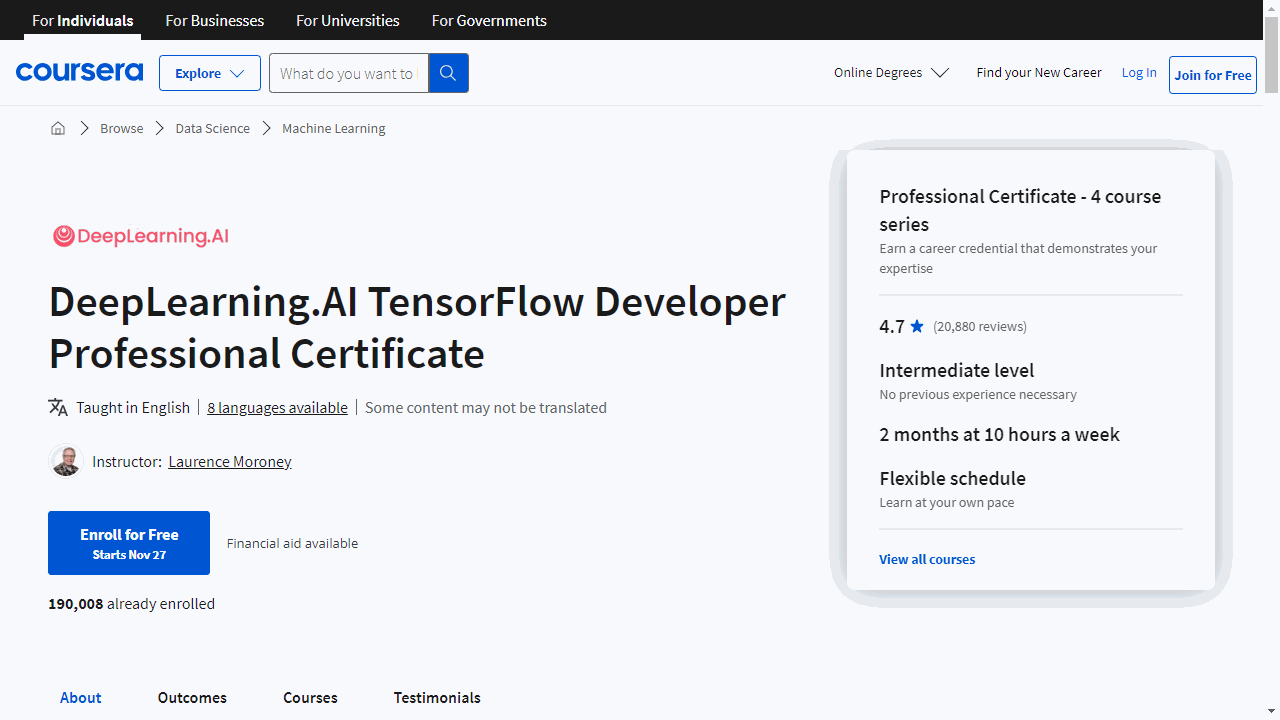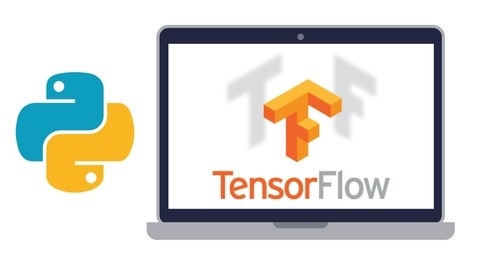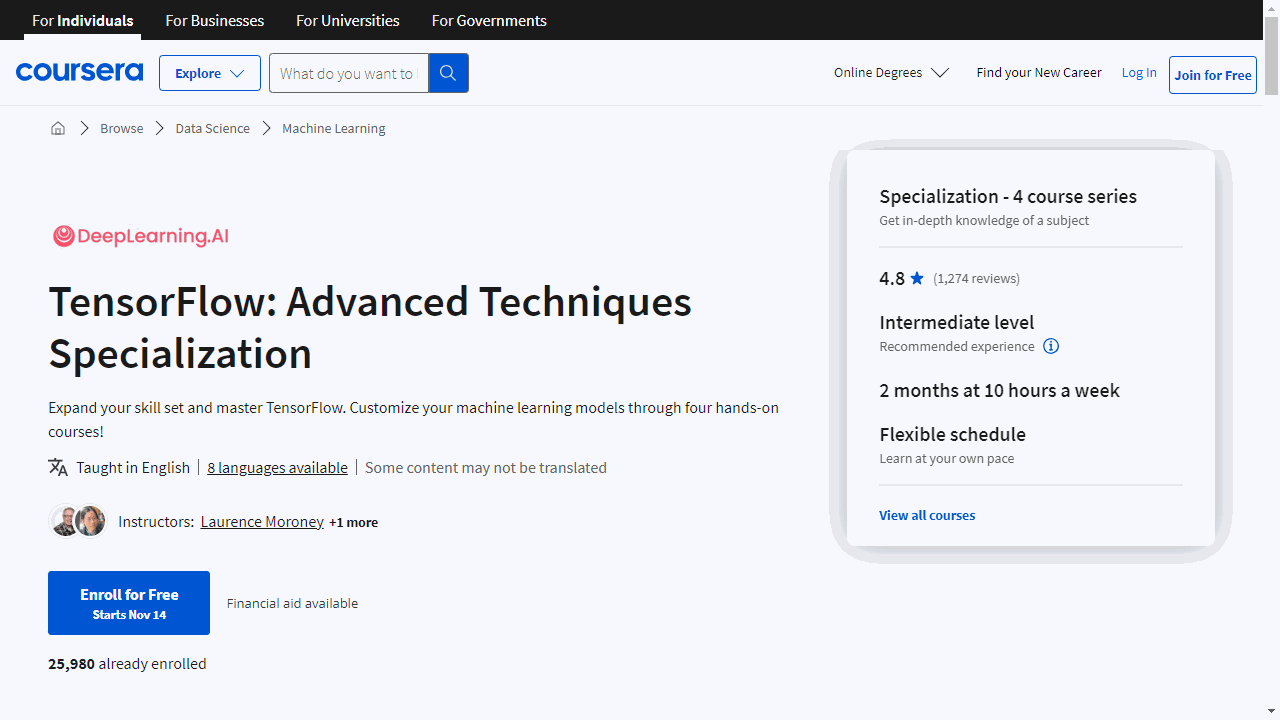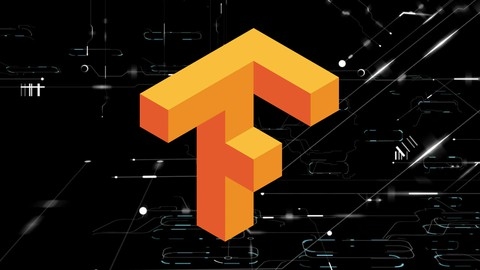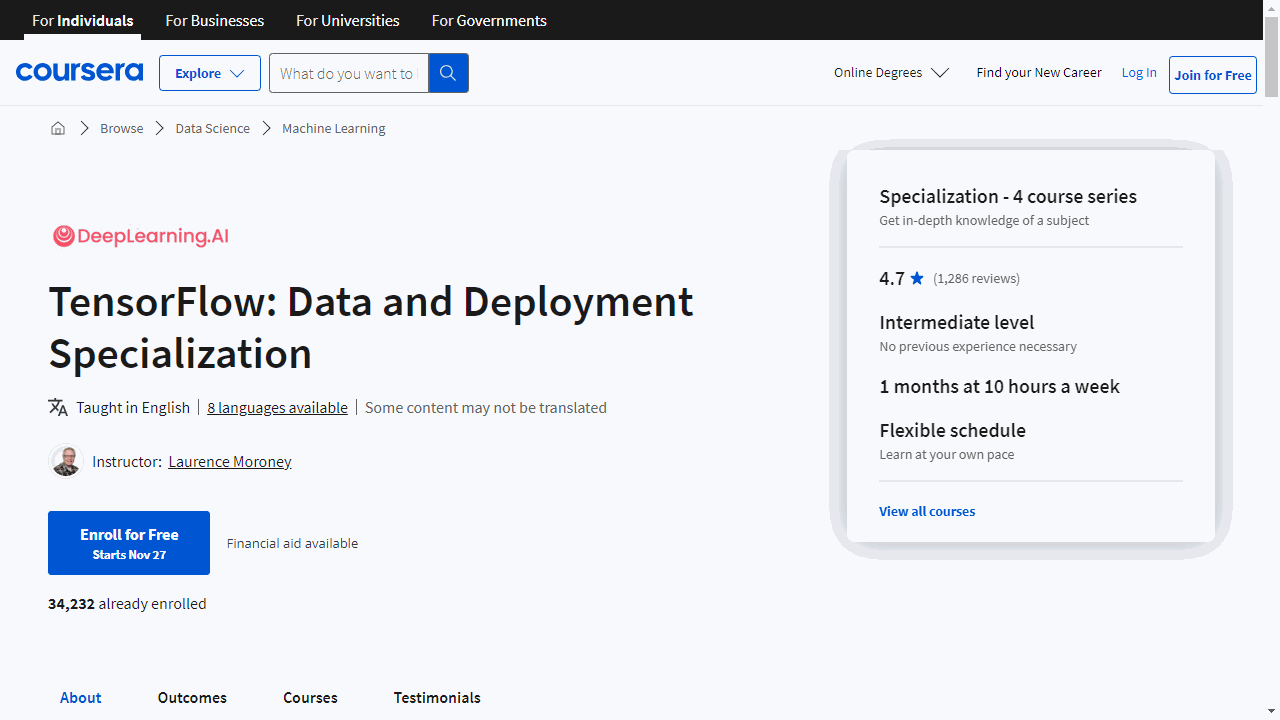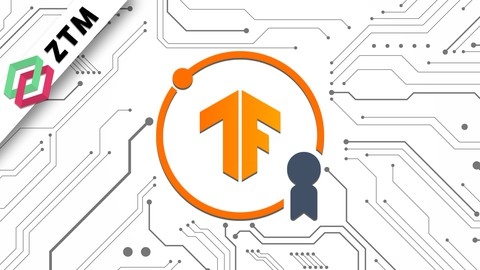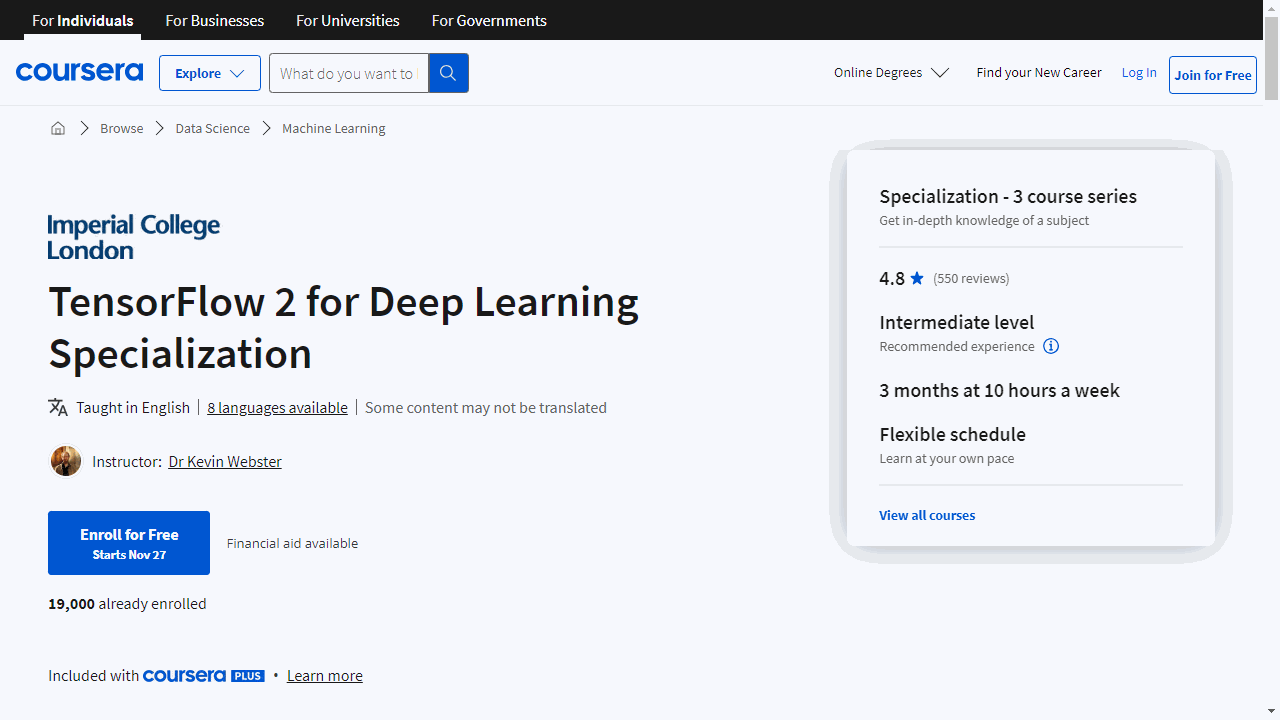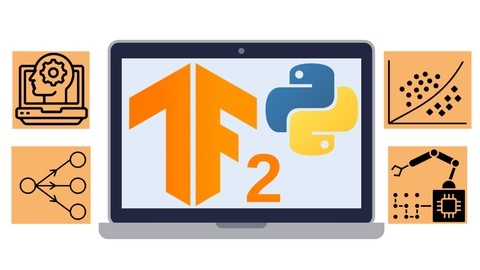TensorFlow, developed by Google, has become a cornerstone of deep learning and machine learning, powering everything from image recognition and natural language processing to self-driving cars and medical diagnoses.
By mastering TensorFlow, you gain the ability to build and deploy sophisticated AI models, opening doors to exciting career opportunities and enabling you to tackle complex real-world problems.
Whether you’re a seasoned programmer or just starting your AI journey, TensorFlow provides a flexible and powerful framework for bringing your ideas to life.
However, finding a top-notch TensorFlow course that provides a comprehensive and practical learning experience can be a challenge.
With the abundance of options available, it’s easy to get lost in a sea of courses, unsure which one will best equip you with the skills you need.
You’re searching for a course that not only covers the theoretical foundations but also provides hands-on experience, allowing you to build and deploy real-world TensorFlow projects.
Based on our in-depth analysis, the DeepLearning.AI TensorFlow Developer Professional Certificate offered on Coursera stands out as the best TensorFlow course overall.
This comprehensive program, developed by deep learning pioneer Andrew Ng, provides a structured and engaging learning path, guiding you from the fundamentals of TensorFlow to building production-ready AI applications.
With its hands-on projects and expert instruction, this certificate equips you with the skills and knowledge needed to excel as a TensorFlow developer.
While the DeepLearning.AI TensorFlow Developer Professional Certificate is our top recommendation, we understand that different learners have unique needs and preferences.
That’s why we’ve compiled a list of other exceptional TensorFlow courses, catering to various skill levels and areas of focus.
So, whether you’re a beginner or an experienced developer, keep reading to discover the perfect TensorFlow course to propel your AI journey forward.
DeepLearning.AI TensorFlow Developer Professional Certificate
Provider: Coursera
You want to become a TensorFlow expert?
This DeepLearning.AI TensorFlow Developer Professional Certificate is a great way to gain practical skills in building scalable AI-powered applications.
This specialization equips you with the tools and knowledge to implement machine learning and deep learning models using TensorFlow, a popular open-source framework.
You’ll begin by learning the best practices for using TensorFlow.
You start with the basics by building simple neural networks and then progress to training them for computer vision applications, such as image recognition.
You’ll work with real-world images, even learning how computers “see” using a technique called convolution.
You even learn how to prevent your models from overfitting.
Next, you’ll dive into making machines understand human language with natural language processing (NLP) using TensorFlow.
You’ll learn how to break down sentences into smaller units, a process called tokenizing, and represent them in a format that neural networks can understand.
You’ll work with different types of neural networks that are good at handling sequences of data, such as RNNs, GRUs, and LSTMs.
You’ll even get to train an LSTM on existing text to generate your own original poetry.
Finally, you’ll discover how to work with data that changes over time, like stock prices or weather patterns, using time series modeling and prediction.
You learn how to prepare time series data and use different types of neural networks, like RNNs and 1D ConvNets, to make predictions.
You’ll test your skills by building a sunspot prediction model using real-world data.
Complete Guide to TensorFlow for Deep Learning with Python
Provider: Udemy
This course equips you with the knowledge to build your own deep learning models using TensorFlow and Python.
You’ll start with the fundamentals of neural networks, understanding concepts like gradient descent and backpropagation.
You’ll learn how to install TensorFlow and set up your development environment on both macOS and Linux.
Don’t worry if you are new to Python libraries like NumPy, Pandas, and SciKit Learn, as the course includes a crash course to get you up to speed.
You will then transition into the practical side of TensorFlow, where you’ll build, train, and evaluate neural networks.
You will work on hands-on examples, including the MNIST dataset, applying TensorFlow to real-world problems.
You will dive into convolutional neural networks (CNNs) to understand the principles behind them and implement them in TensorFlow.
The course also covers recurrent neural networks (RNNs) and how to build LSTM networks to process sequential data.
This course doesn’t just stop at the basics.
It challenges you to explore more advanced concepts like reinforcement learning.
You will learn how to create agents that can learn and solve problems in environments like OpenAI Gym using techniques like policy gradient algorithms.
You’ll even learn about and implement Generative Adversarial Networks (GANs) for generating new data.
With this comprehensive course, you gain a strong foundation in TensorFlow and deep learning, enabling you to tackle real-world problems across different fields.
TensorFlow: Advanced Techniques Specialization
Provider: Coursera
The “TensorFlow: Advanced Techniques Specialization” on Coursera takes your TensorFlow skills beyond the basics, letting you build and train powerful machine learning models.
You start by mastering the Functional API, giving you granular control over your model’s architecture, crafting custom layers and loss functions tailored to specific tasks.
You even create custom models like Siamese networks for unique challenges.
You then explore custom training loops, gaining control over the learning process using GradientTape to calculate gradients and optimize performance.
You’ll discover the efficiency of graph mode for running TensorFlow code and unlock the power of distributed training with TPUs and GPUs for faster training of larger models.
Get ready to dive into advanced computer vision tasks, including object localization and detection.
You’ll work with object detection models like ResNet-50, identifying and labeling objects within images.
You also explore image segmentation with techniques like U-Net and Mask-RCNN, separating objects, numbers, and other elements within images.
You even learn to interpret your models using saliency maps and class activation maps, understanding how they make predictions.
Finally, you unleash the power of generative models to create new data.
You explore neural style transfer, blending the content of one image with the style of another.
You discover AutoEncoders and Variational AutoEncoders (VAEs) for generating data and even build your own Generative Adversarial Network (GAN) to produce realistic images of faces.
Tensorflow 2.0: Deep Learning and Artificial Intelligence
Provider: Udemy
This Tensorflow 2.0 course starts you off with the fundamentals of machine learning and neurons, focusing on important concepts like classification and regression.
You quickly move into building Artificial Neural Networks (ANNs) using Tensorflow 2.0.
Here you’ll learn about forward propagation, activation functions, and how to prepare images for classification tasks.
You’ll then explore Convolutional Neural Networks (CNNs), using them for image classification with datasets like Fashion MNIST and CIFAR-10.
The course dives into data augmentation and batch normalization to help you improve the performance of your models.
You’ll then move on to Recurrent Neural Networks (RNNs) and learn how they’re used to analyze time series and predict sequence data.
You’ll gain hands-on experience working with LSTMs and GRUs to build a stock prediction model.
The course then explores more advanced concepts such as natural language processing (NLP), building recommender systems, and how to perform transfer learning for computer vision.
You will learn about pre-trained models like VGG, ResNet, Inception, and MobileNet, and use them to boost your model’s accuracy.
You’ll explore the exciting world of Generative Adversarial Networks (GANs) used to create realistic images, and Deep Reinforcement Learning (DRL) by building a real-world stock trading project using DQN.
Finally, you’ll learn about advanced TensorFlow usage, including deploying your models as web services using TensorFlow Serving, running your models on mobile devices with Tensorflow Lite, and using the TPU for large-scale projects.
You’ll build a solid foundation in TensorFlow 2.0, gaining the ability to build your own deep learning projects.
You’ll learn to code solutions using Python and TensorFlow and become familiar with essential tools like Numpy, Pandas, Scikit-Learn, Matplotlib, Keras, and Jupyter Notebook.
TensorFlow: Data and Deployment Specialization
Provider: Coursera
This specialization guides you through using TensorFlow to apply machine learning in practical settings.
You begin by learning to train and run models directly in your browser with TensorFlow.js.
This allows you to create sophisticated computer vision projects, such as building an object recognition model using your webcam.
Next, you venture into the world of mobile and embedded systems.
You learn how to optimize your models for devices with limited resources like smartphones and the Raspberry Pi.
This enables you to develop applications for various platforms, ranging from Android and iOS to compact, energy-efficient devices.
You then explore data pipelines using TensorFlow Data Services, an essential aspect of machine learning projects.
This involves mastering ETL tasks, working with large datasets, preparing them for training, and even sharing your curated datasets globally through TensorFlow Hub.
Finally, you discover advanced deployment techniques.
You learn about TensorFlow Serving for web-based inference, explore TensorFlow Hub’s pre-trained models for transfer learning, and use TensorBoard to understand and evaluate your models.
You also delve into federated learning, a privacy-conscious approach for retraining deployed models using data from multiple sources without compromising user privacy.
TensorFlow Developer Certificate Bootcamp
Provider: Udemy
This TensorFlow Developer Certificate Bootcamp takes you from the basics of deep learning to building complex models for real-world applications.
You start by understanding the fundamentals of tensors, the foundation of TensorFlow, and learn how to perform operations like matrix multiplication.
You then dive into neural networks, learning how to build models for regression and classification tasks.
You discover how to predict values, like estimating house prices, and how to categorize data, such as identifying objects in images.
The course then introduces you to convolutional neural networks (CNNs), a powerful tool for computer vision.
You learn how to build CNN models for image classification and explore techniques like data augmentation to improve their performance.
You also master transfer learning, a technique that allows you to leverage pre-trained models, like ResNet and EfficientNetB0, to build accurate models with less data using TensorFlow Hub.
You then explore the world of natural language processing (NLP).
You learn how to work with text data, build models using recurrent neural networks (RNNs) like LSTMs and GRUs, and even explore Conv1D models for text analysis.
The course introduces you to essential NLP concepts such as tokenization and embedding, and you learn how to apply transfer learning to NLP tasks.
Finally, you delve into time series analysis and forecasting.
You learn how to work with time series data, build models to identify patterns, and make predictions using techniques like windowing and horizons.
You explore different algorithms, including the N-BEATS algorithm, and build ensemble models for more accurate forecasting.
The course utilizes practical examples, such as predicting Bitcoin prices, and introduces you to the concept of prediction intervals for understanding forecast uncertainty.
TensorFlow 2 for Deep Learning Specialization
Provider: Coursera
This TensorFlow 2 specialization equips you with the tools to build and implement sophisticated deep learning models.
You’ll begin by mastering the fundamentals of TensorFlow, learning to build, train, and evaluate models using the Sequential API.
You’ll become proficient in crucial techniques like regularization, callbacks, and saving and loading models.
You will then transition into customizing models with TensorFlow 2’s lower-level APIs.
You’ll construct complex model architectures, design custom layers, and create a flexible data workflow.
Additionally, you’ll explore sequence models, ideal for handling data with a temporal order, such as text or time series data.
Finally, you’ll delve into the world of probabilistic deep learning, learning to incorporate probability distributions into your models to manage uncertainty in real-world datasets.
Using the TensorFlow Probability library, you’ll build models for uncertainty quantification and generative models capable of producing new samples similar to the training data.
Think of applications like autonomous vehicles where understanding the probability of different outcomes is crucial.
Complete Tensorflow 2 and Keras Deep Learning Bootcamp
Provider: Udemy
This Udemy course equips you with a strong understanding of deep learning, taking you from the basics to advanced concepts.
You’ll begin by mastering essential Python libraries: NumPy for numerical computing and Pandas for data manipulation and analysis.
This foundation in data handling is crucial for building deep learning models.
You’ll then learn to visualize data using Matplotlib and Seaborn, gaining insights that go beyond numbers.
The course then introduces you to fundamental machine learning concepts, including supervised and unsupervised learning techniques, the concept of overfitting, and different ways to evaluate a model’s performance.
With this theoretical background, you’ll dive into the practical world of building deep learning models using TensorFlow and Keras.
You’ll start by creating, training, and evaluating Artificial Neural Networks (ANNs) for tasks like classification and regression.
You’ll then explore different types of neural networks and their applications.
You’ll learn to build Convolutional Neural Networks (CNNs) for image recognition tasks, working with datasets like MNIST and CIFAR-10.
You’ll also explore Recurrent Neural Networks (RNNs), including LSTMs and GRUs, for handling sequential data, which is essential for tasks like time series analysis and natural language processing (NLP).
You’ll even delve into advanced topics like Autoencoders for dimensionality reduction and Generative Adversarial Networks (GANs) for generating realistic images.
Finally, you’ll learn how to deploy your trained models using Flask, bringing your deep learning projects to life as web applications.
Also check our posts on:
